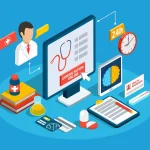
The Importance of Hospital Culture in Healthcare Excellence
In the ever-evolving landscape of healthcare, ensuring a positive hospital culture is crucial for the well-being of both patients and staff. One often overlooked aspect that plays a pivotal role in shaping this culture is the efficiency of hospital maintenance.
An effective maintenance department in a hospital not only upholds safety and compliance but also significantly impacts overall patient satisfaction and staff morale. This article explores how optimizing maintenance in hospitals can enhance hospital culture and offers insights into effective management strategies.
The Importance Of Hospital Maintenance
Hospital maintenance is more than just fixing broken equipment or addressing cosmetic issues; it is a critical component of healthcare administration that influences the functionality, safety, and comfort of hospital environments. A well-maintained facility ensures:
- Safety and Compliance: Regular maintenance helps in adhering to safety regulations and standards, preventing accidents and ensuring a secure environment for patients and staff.
- Operational Efficiency: Timely repairs and upkeep prevent downtime of essential equipment and systems, which is crucial for the smooth operation of healthcare services.
- Patient Satisfaction: Clean and well-maintained facilities contribute to a more positive patient experience, fostering trust and satisfaction.
- Staff Morale: A well-maintained environment supports staff efficiency and reduces stress, leading to better job satisfaction and performance.
The Role Of The Maintenance Department In Hospitals
The maintenance department in a hospital is responsible for ensuring the proper functioning of equipment and facilities through inspections, repairs, and compliance management, thereby supporting a safe and efficient healthcare environment.
Responsibilities Of The Maintenance Department
The maintenance department in a hospital is tasked with a range of responsibilities, including:
- Routine Inspections and Preventive Maintenance: Regular checks and proactive measures to prevent equipment failures and system breakdowns.
- Emergency Repairs: Addressing urgent issues swiftly to minimize disruption and ensure continuous patient care.
- Compliance Management: Ensuring that all equipment and facilities meet healthcare regulations and standards.
- Facility Upgrades: Implementing improvements and renovations to keep up with technological advancements and evolving healthcare needs.
Staffing and Expertise
An efficient hospital maintenance department requires a team of skilled professionals, including:
- Maintenance Technicians: Responsible for day-to-day repairs and maintenance tasks.
- Facility Managers: Oversee the operations of the maintenance department and ensure alignment with hospital administration goals.
- Specialized Engineers: Handle complex systems such as HVAC, electrical, and plumbing.
Enhancing Hospital Culture Through Effective Maintenance Management
Enhancing hospital culture through effective maintenance management means improving the overall environment and atmosphere of a healthcare facility by optimizing maintenance practices. This approach ensures timely repairs, preventive measures, and a well-maintained infrastructure, contributing to better patient experiences and increased staff satisfaction.
Streamlining Communication
Efficient communication channels between the maintenance department and hospital administration are crucial. Implementing a centralized issue management system allows for:
- Real-Time Reporting: Staff can report maintenance issues as they arise, ensuring timely attention.
- Tracking and Documentation: Maintenance requests and resolutions are tracked and documented for transparency and future reference.
Implementing Preventive Maintenance Programs
Preventive maintenance helps in identifying potential issues before they become critical. By establishing a robust preventive maintenance program, hospitals can:
- Reduce Unexpected Breakdowns: Regular maintenance schedules help in mitigating the risk of sudden equipment failures.
- Enhance Safety: Routine checks ensure that all equipment and facilities are safe for use, minimizing risks to patients and staff.
Training and Development
Ongoing training for maintenance staff is essential for keeping up with the latest technologies and best practices. Investing in professional development ensures:
- Skill Enhancement: Maintenance staff are well-equipped to handle advanced equipment and complex systems.
- Increased Efficiency: Well-trained personnel can perform tasks more quickly and accurately, reducing downtime and improving overall service quality.
Leveraging Technology
Modern technology can greatly enhance the efficiency of maintenance operations. Key technological advancements include:
- Automated Maintenance Management Systems (CMMS): These systems help in scheduling, tracking, and managing maintenance tasks efficiently.
- Smart Sensors and IoT: These technologies provide real-time data on equipment performance, allowing for proactive maintenance actions.
Conclusion
The integration of an efficient maintenance strategy within hospital administration is vital for fostering a positive Hospital Culture. By prioritizing effective maintenance management, hospitals can ensure a safer, more comfortable environment for patients and staff, ultimately leading to improved satisfaction and operational efficiency.
Investing in technology, training, and streamlined communication within the maintenance department is key to achieving these goals and enhancing the overall quality of healthcare services, while also reinforcing a strong Hospital Culture.
Frequently Asked Questions?
How Can Technology Improve Hospital Maintenance Operations?
Technology such as CMMS, smart sensors, and IoT can enhance maintenance operations by providing real-time data, automating tasks, and improving tracking and scheduling of maintenance activities. This leads to more efficient and effective management of hospital facilities.
Why Is Preventive Maintenance Important In Hospitals?
Preventive maintenance helps in identifying and addressing potential issues before they become critical problems. This approach reduces the likelihood of unexpected equipment failures, enhances safety, and ensures the smooth operation of hospital services.
What Role Does Training Play In The Efficiency Of The Maintenance Department?
Ongoing training ensures that maintenance staff are up-to-date with the latest technologies and best practices. Well-trained personnel are more efficient and effective in handling maintenance tasks, which contributes to overall operational efficiency, safety, and a positive Hospital Culture.
Enhance Patient Care and NABH Compliance with LazyMonkey
LazyMonkey is your all-in-one solution for improving patient care, retaining more patients, and meeting NABH standards. Our powerful QR-based feedback tool enables you to capture real-time insights from patient feedback, discharge surveys, staff and doctor evaluations, and clinical research, while also streamlining inter-departmental communication.
Transform your healthcare facility today - reach out to us at hello@lazymonkey.in, or request a demo here!
Elevate Your Restaurant Experience with LazyMonkey
LazyMonkey’s QR-based feedback system helps you gather real-time insights from customers, track satisfaction levels, and enhance the dining experience. Get instant feedback on your menu, service, and ambience, and make data-driven improvements to boost repeat customers and reviews.
Improve your restaurant today – reach out to us at hello@lazymonkey.in, or request a demo here!
Empower Student Engagement and Campus Improvement with LazyMonkey
LazyMonkey offers a seamless way to gather student feedback, track satisfaction, and enhance campus life. From course evaluations to dorm feedback, our QR-based solution makes it easy to capture valuable insights and improve student retention.
Upgrade your university experience – contact us at hello@lazymonkey.in, or request a demo here!
Streamline Feedback and Drive Performance Across Your Enterprise/Franchise with LazyMonkey
Whether you manage one or multiple locations, LazyMonkey’s QR-based feedback system helps you gather real-time employee and customer feedback. Improve operational efficiency, track satisfaction, and make data-driven decisions to enhance brand consistency and growth.
Transform your franchise today – reach out to us at hello@lazymonkey.in, or request a demo here!
Enhance Customer Satisfaction and Service Standards in Banking with LazyMonkey
LazyMonkey empowers banks to capture real-time feedback from clients across branches. Improve customer experience, assess service quality, and ensure regulatory compliance with our QR-based solution, helping you retain clients and meet banking standards.
Elevate your bank’s customer care – contact us at hello@lazymonkey.in, or request a demo here!
Boost Customer Engagement and Mall Satisfaction with LazyMonkey
LazyMonkey’s QR-based feedback tool enables you to collect feedback from shoppers, track satisfaction, and enhance the mall experience. Gather insights on store services, cleanliness, and entertainment to create an unmatched customer journey.













